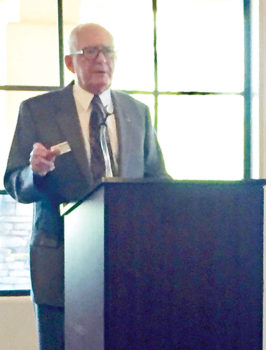
Lieutenant Colonel (U.S. Army retired) Byron “Pat” Webb
Colonel Rett Benedict (U.S.A.F. retired), President, Catalina Mountains Satellite
Lieutenant Colonel (U.S. Army retired) Byron “Pat” Webb was our season opening speaker discussing important pharmaceutical topics based on his military and civilian experience. He served 20 years in the Army beginning as a pharmacy officer, having multiple field, hospital and headquarters assignments and ending his military career as the Inspector General of the Fitzsimons Army Medical Center in Denver. Subsequently he became a partner in a group of Denver clinic pharmacies for 10 years. He and his wife Barbara have been in SaddleBrooke since 2000.
Lieutenant Colonel Webb described his early years learning the pharmacy basics and business in college. He quickly found out there was far more to it than “pouring pills from a big bottle to a small bottle.” A good pharmacist needs a broad background in chemistry, physics and biology in order to provide the expertise needed to advise patients on effects of their medications, how to take them and how to avoid complications. Our medicines are generally targeted to specific areas of our anatomy – bones, heart, lungs etc. – but it seems they almost all get involved with the liver and stomach in order to get where they are going. We learned a lot about human physiology during this talk.
The human body is a complex electro-chemical and biological mechanism. The pharmaceutical industry has been very good at developing medicines than can help a wide range of conditions; however, interactions between these pills can have consequences that are quite serious. Lieutenant Colonel Webb gave an example of where two drugs might offset the effects of each other thus giving the patient no help because of the combination. A second example was also for two drugs, prescribed to treat two different conditions, but they might have some overlapping effects thus giving us a “double dose.” This could be a life threatening situation.
Lieutenant Colonel Webb emphasized how important it is that we know what we are taking and make sure our different doctors and clinics have or are given by us, that information so they can check for drug interactions. Our pharmacists can also be an excellent source of information about taking medicines properly and guarding against side effects. These two recommendations were probably the most important part of this talk.
The next Catalina Mountains Chapter of MOAA meeting will be held on Saturday, November 18, 2017, at 11:30 a.m. in the East Room, MountainView Country Club, 38759 S. MountainView Boulevard, Tucson, Arizona 85739, with the Administrator from the Arizona Veterans Memorial Cemetery at Marana, Ms. Bonnie Dudelston, as our speaker.
For additional information, contact Colonel Rett Benedict, president, 825-7424, rettbenedict@gmail.com or Colonel Tom Owens, MOAA Tucson President, 760-3476, owensttt@gmail.com. Check website: www.tucsonmoaa.com for information.
The Catalina Mountains satellite is part of the Tucson Chapter and encompasses northwest Tucson to include Catalina, Oracle, parts of Oro Valley and Marana, SaddleBrooke and Sun City.
The Military Officers Association of America (MOAA) is a nonprofit veteran’s service association dedicated to maintaining a strong national defense and to preserve the earned entitlements of members of the uniformed services and their families and survivors.
